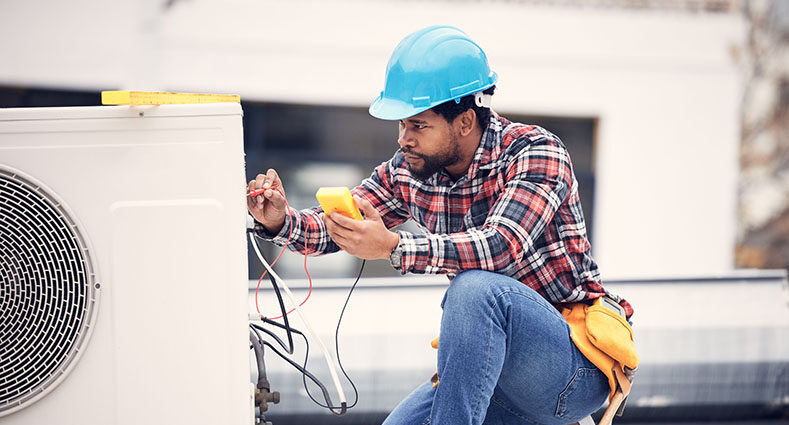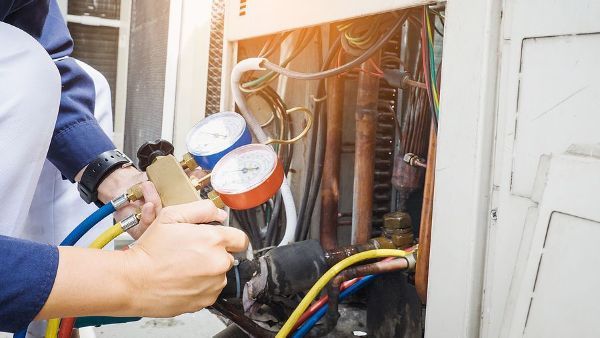HVAC contractor tips for spotting bad odors early
The Relevance of Heating And Cooling Expertise: Discovering Reasons For Air Conditioner Troubles for Homeowners
House owners typically overlook the relevance of understanding their a/c systems. Identifying usual signs of a/c issues can result in prompt interventions. Concerns like insufficient cooling or unusual sounds are not just nuisances; they can show much deeper worries. By checking out the source of these troubles, house owners can enhance system performance and prolong its lifespan. What are one of the most common problems that can develop, and exactly how can they be successfully resolved?
Common Indications of Air Conditioner Issues
Just how can home owners identify issues with their air conditioning systems prior to they intensify? Acknowledging typical indications of AC troubles is essential for timely upkeep. One prevalent indication wants cooling; if the cooling system stops working to reduce the indoor temperature level, it might indicate underlying concerns. Unusual sounds, such as grinding or hissing, can also indicate mechanical failures or loose components - HVAC company. Furthermore, property owners need to watch out for strange smells emanating from the unit, which might recommend mold development or electric issues. Frequent cycling on and off, recognized as short biking, can indicate thermostat concerns or cooling agent leaks. Additionally, a boost in energy bills without a corresponding increase in use might indicate ineffectiveness. By staying sharp to these indication, house owners can protect against a lot more considerable issues and expensive repairs, guaranteeing their air conditioning systems run efficiently throughout the warmer months

Understanding Refrigerant Issues
Refrigerant issues can significantly impact the effectiveness of a cooling and heating system. Home owners should recognize the signs of low cooling agent degrees and the importance of finding cooling agent leakages. Dealing with these issues promptly can stop more damages to the system and assurance peak cooling down efficiency.
Low Cooling Agent Levels
A common concern that homeowners might experience with their HVAC systems is reduced refrigerant degrees, which can considerably impact the system's effectiveness and efficiency. Refrigerant is important for the cooling process, soaking up warm from interior air and releasing it outside. When levels go down, the a/c device has a hard time to cool the room properly, resulting in enhanced power usage and prospective system strain. Signs of low cooling agent consist of insufficient cooling, longer run times, and ice formation on the evaporator coils. Homeowners may also discover uncommon sounds as the compressor functions harder to compensate for the shortage. It is essential for homeowners to understand the value of maintaining correct refrigerant degrees to ensure peak a/c performance and durability.
Refrigerant Leaks Detection
Where might a property owner begin when confronted with the opportunity of refrigerant leaks in their cooling and heating system? The initial step involves keeping track of the system's efficiency. Signs such as decreased cooling down efficiency, ice formation on coils, or hissing noises might indicate a refrigerant leak. Home owners need to additionally look for noticeable indicators of oil deposit, frequently an indicator of a leakage. Making use of a cooling agent leak detector can give even more accurate identification. If uncertainties linger, consulting a licensed heating and cooling specialist is essential, as they have the expertise and tools to locate leaks successfully. Trigger discovery and repair of refrigerant leaks not only enhance system performance but also protect against possible ecological harm, making it a vital facet of HVAC upkeep.
Electric Failures and Their Impact
Electric failures can substantially affect a/c systems, particularly via issues like breaker breakdowns and malfunctioning wiring. These problems not only interrupt the system's efficiency yet can also lead to pricey repair services and safety dangers. Comprehending the effects of such failures is crucial for homeowners to keep an effective and safe heating and cooling atmosphere.
Breaker Issues
Just how can circuit breaker problems impact the efficiency of a HVAC system? Circuit breakers function as vital safety and security tools that manage electrical flow to cooling and heating units. If a breaker journeys regularly, it interferes with power supply, causing inconsistent home heating or air conditioning. This can trigger significant stress on the system, leading to inefficient procedure and prospective damages to components. Property owners might observe boosted power bills because of the a/c system's struggle to keep preferred temperatures. Furthermore, duplicated disturbances from stumbled breakers can reduce the life expectancy of the air conditioner unit, calling for pricey fixings or substitutes. Normal upkeep of breaker is vital, as it assures a stable power supply, eventually boosting the general performance of the a/c system.
Faulty Circuitry Impact
Regularly neglected, damaged electrical wiring can have alarming repercussions for cooling and heating systems. Circuitry problems may bring about brief circuits, causing constant failures and increased repair service expenses. Additionally, inappropriate wiring can cause inefficient power usage, resulting in greater utility costs and pressure on the system. In extreme cases, faulty wiring can trigger electrical fires, posturing a substantial security risk to homeowners. In addition, these electrical failures can damage cooling and heating components, leading to costly substitutes or considerable repair work. Property owners need to prioritize normal examinations by qualified specialists to identify and correct circuitry problems prior to they escalate. Comprehending the effects of damaged wiring can aid assure the longevity and safety and security of HVAC systems, eventually securing both the home and check here its owners.
Clogged Filters and Their Repercussions
While many homeowners might forget the value of regular filter maintenance, clogged up filters can lead to significant repercussions for cooling and heating systems. When filters become obstructed with dirt, dust, and debris, air flow is limited. This decrease in air flow compels the system to function harder, resulting in raised power consumption and possibly greater utility costs. In time, this pressure can cause wear and tear on elements, resulting in early system failure.
In addition, clogged up filters can jeopardize indoor air high quality. Contaminants and irritants might distribute throughout the home, intensifying respiratory system concerns and allergic reactions for passengers. Moreover, insufficient air flow can trigger the evaporator coil to freeze, resulting in expensive repair services and ineffective air conditioning performance. Frequently transforming website or cleaning up filters is a basic yet vital maintenance task that can aid assure the longevity and effectiveness of cooling and heating systems, inevitably benefiting both the homeowner's comfort and their financial resources.

Thermostat Malfunctions Clarified
What occurs when a thermostat breakdowns can considerably impact both convenience and energy effectiveness in a home (ac unit replacement). A damaged thermostat may stop working to accurately read the temperature level, bring about overcooling or not enough air conditioning. This disparity can cause pain for owners and cause higher energy costs, as the heating and cooling system works harder than required
Common problems consist of dead batteries, which can make electronic thermostats defective, and loosened electrical wiring that interferes with communication between the thermostat and the HVAC device. Furthermore, outdated or improperly adjusted thermostats might not respond appropriately to temperature level changes, even more intensifying power inadequacy.
Homeowners must be watchful for indications of breakdown, such as irregular temperatures or unexpected energy prices. Routine checks and understanding of the thermostat's performance can assist determine troubles early, guaranteeing peak efficiency of the a/c system. Addressing thermostat concerns quickly is crucial for preserving a comfy living setting and handling power intake effectively.
The Role of Routine Upkeep
Normal upkeep plays a vital duty in making sure the durability and performance of HVAC systems. Home owners that prioritize routine checks can stop small concerns from intensifying into expensive repair services. Normal maintenance commonly includes jobs such as cleaning filters, evaluating ductwork, and checking cooling agent levels. These tasks help preserve optimal air flow and system efficiency, reducing power consumption.
A well-maintained Cooling and heating system runs more effectively, supplying constant comfort throughout the home. Normal tune-ups can also expand the life-span of the device, causing considerable savings with time. Property owners are encouraged to arrange specialist evaluations at the very least yearly to recognize potential problems early.
In addition, several suppliers need routine maintenance to support service warranties, making this method not just advantageous however often required. check here Overall, comprehending the relevance of regular upkeep empowers house owners to guard their cooling and heating systems against unanticipated failings and boost their investment in home comfort.
Regularly Asked Questions
Exactly How Can I Improve My Air conditioning's Power Effectiveness?
Improving an a/c's power efficiency involves normal upkeep, cleansing or replacing filters, securing ductwork, ensuring appropriate insulation, using programmable thermostats, and scheduling professional evaluations to identify and remedy prospective issues affecting efficiency.
What Is the Life-span of a Regular A/c System?
A regular air conditioning device has a life-span of 15 to twenty years, depending on upkeep, usage, and ecological elements. Routine upkeep can substantially prolong its operational life and boost total efficiency.
When Should I Change My Air Conditioning System?
An a/c system should generally be changed every 10 to 15 years. Indicators for substitute include regular repairs, climbing energy bills, and inadequate air conditioning, showing that an upgrade may be much more affordable and efficient.
Can I Fix AC Problems Myself?
Yes, individuals can repair air conditioner problems themselves by inspecting filters, guaranteeing power supply, and evaluating for noticeable problems (ac fix). However, intricate troubles usually require professional support for precise medical diagnosis and safe repair, making sure suitable system efficiency
How Do I Choose a Reputable A/c Specialist?

To choose a reputable heating and cooling professional, one need to seek recommendations, inspect on-line reviews, confirm licenses and insurance, analyze experience, and request thorough estimates to guarantee high quality solution and fair pricing prior to making a decision.
Verdict
To summarize, a solid understanding of a/c systems allows property owners to successfully detect and resolve usual a/c problems. Recognizing signs such as insufficient cooling or rising energy prices enables prompt treatments, which can significantly improve system effectiveness and longevity. By remaining informed concerning possible problems like cooling agent leakages, electrical failings, and clogged up filters, homeowners can take aggressive measures to keep their systems, eventually ensuring convenience and advertising a healthier living atmosphere. Normal upkeep continues to be crucial to this endeavor.